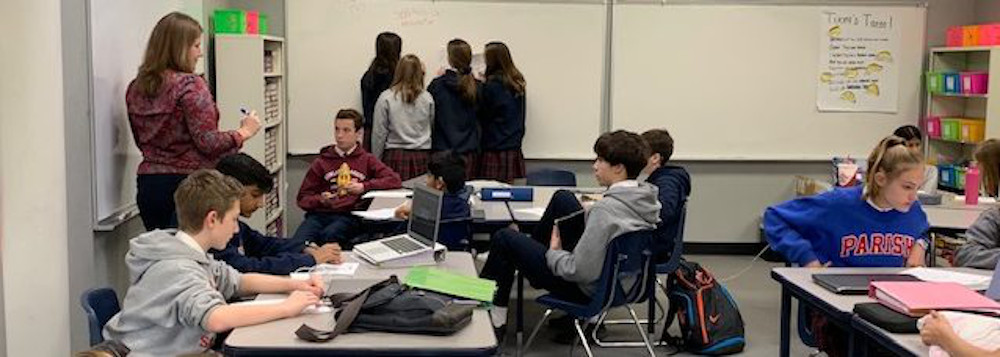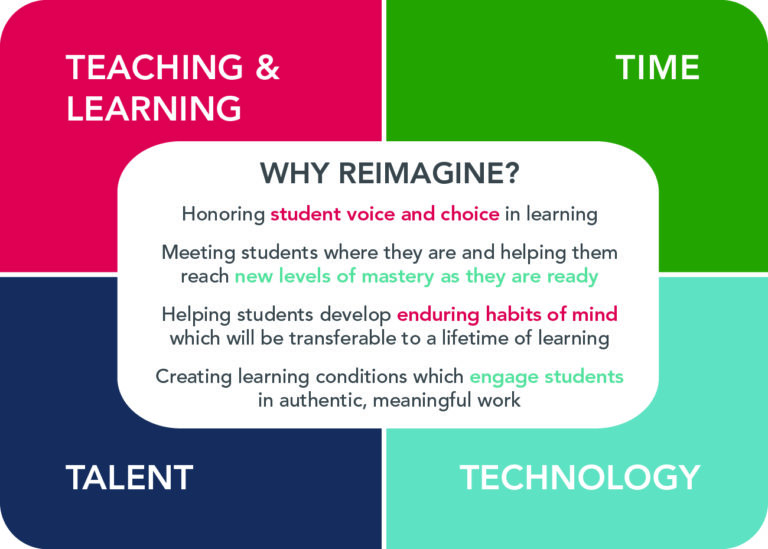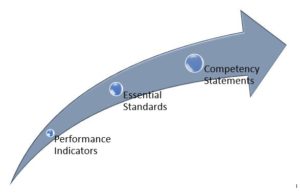Already a member? Log in to the Member Site at members.mastery.org.

Grading for Equity
February 13, 2019
The MTC Network: Meet Valerie Greenhill
April 4, 2019Member Voices: Reimagining School


Michelle Lyon, assistant head of school at MTC member Parish Episcopal High School, shares how her community transformed the way it was “doing school.” Lyon also shares two journey maps: one that showcases the change process for student engagement and another for teaching and learning.
In early 2017, I attended the Mastery Transcript Consortium (MTC) session at NAIS in Baltimore, MD. I left that meeting feeling validated, hopeful, and energized. Parish Episcopal School (Parish) had been on a like-minded mission since 2013-2014, when we too recognized that the way we were “doing school” needed to change. We joined the MTC as a member school and have not looked back; we finally found a partner that was going to help further our strategic vision of “Reimagine School.”
Preparing Modern Learners
In 2013-2014, Parish’s Head of School, Dave Monaco, posed a generative question: What emerging conditions in the PreK-12 marketplace present sustainable, value-added opportunities for school leadership? We asked a task force comprised of board members, administration, parents, alumni, and faculty to think boldly about what school should look like for our modern learners. The Parish task force conceived a moonshot of “Reshape Programming to Produce Life Ready, Modern Learners.” Our findings demonstrated a need to explore:
- Flexible student scheduling to increase student engagement
- A system where students could move at readiness when they demonstrated competency
- The shifting role of the teacher
Following the task force findings, Parish hired two consultants: 2Revolutions and Competency-Based Education Specialist, Rose Colby. With the guidance from our consultants, we were able to synthesize the research from the task force and build a framework for the moonshot of Reshape Programming, known among our constituents as “Reimagine School.” During the 2014-2015 school year, our research and planning delivered the four main components of our Reimagine School plan:
- How would we articulate, deliver and pace our curriculum?
- How would we utilize time and engage our students?
- How would we leverage technology in the learning process?
- How do we train our faculty to implement this vision?

We continued to refine our framework and this graphic evolved to represent our Strategic Plan of Reimagine School.Parish Episcopal With the initial research, development, and planning of the Reimagine School framework complete, we were ready in 2015-2016 to begin implementation of the key components with faculty.
Rethinking Teaching and Learning
With the support and guidance of Rose Colby, we outlined a multi-step curriculum articulation structure that would take four years to build. This academic infrastructure consisted of three main components:
- Competency Statements: Four to eight statements per vertical (PreK to 12th) department that would represent the content and skills through a larger “why” statement. Competency Statements would begin with “Students will demonstrate the ability to….” or “Students will understand that….”
- Essential Standards: Also known as Power Standards, these standards would anchor to the competency statements and would define the range of knowledge and skills that is critical to student success. All essential standards should have endurance (provide students with knowledge and skills over time), leverage (knowledge and skills that span across multiple disciplines), and provide readiness for the next level of learning.
- Performance Indicators: Also known as “I can” statements, these statements indicate the evidence that we need from students to move them along their learning progression.

Faculty began designing the curriculum backward from the competency statements. Professional development from 2015-2018 was designated to building this academic infrastructure. With curriculum articulation underway, additional Reimagine School committees formed to advance our next steps with student engagement (schedule) and technology systems needed to power all aspects of moving students at readiness.
Redesigning Grading & Assessment
The Grading and Assessment Committee, comprised of divisional leadership and faculty, met to research, develop and plan our new grading purpose, habits of work, and grading scale. The accuracy, authority, and dependability of all grades depend on the quality of the methods used to award them. In a Competency-Based System it is important to revisit why you grade. Rose Colby was able to guide us through a design process to write our Grading Purpose for a Competency Based System. With the working draft complete, the committee began to remove habits of work from grading. The grade of “A, for example, may mean the student knew what was intended before instruction began (product); did not learn as well as expected, but tried very hard (process); or simply made significant improvement (progress)” (Guskey, 2011). The Grading & Assessment Committee used half-day retreats beginning in 2016-2017 to design the Habits of Work (HOW) for each division. Lower School would also include Social/Emotional indicators as well. The full faculty would edit each iteration during professional development time. In 2018-2019, the committee convened to draft an all school document for vertical alignment.
Next steps will include a committee with divisional representation who will build a resource library with activities for each HOW. This committee will collaborate with divisional leadership to build a framework or calendar for the roll out of our HOW curriculum from PreK to 12th for August 2019. Our grading scale is a combination scale that includes a progression (descriptive scale that reflects how students are progressing toward a standard without explicit reference to the depth of knowledge) and numeric scale. Our plan at Parish is to move beyond the traditional 0-100 scale and transition to the new grading scale until the Mastery Transcript is available.
At the last MTC site meeting in Fort Worth, it was apparent from the represented schools that we were all somewhere on the continuum to reimagine school for our modern learners. Tapping into the knowledge of the MTC network and joining in regular meetings provide an opportunity for educators to gather, share ideas, and work through challenging logistics of the new transcript and how to shift the paradigm for all of our constituents. Parish has embarked on a dynamic and exciting undertaking. We are committed to the work of the MTC and look forward to our shared interest in creating a balanced and engaging system for our students.
For Your Toolkit: Journey Maps from Parish Episcopal School
Learn more about how Parish Episcopal reimagined student engagement and teaching and learning, and see if some of the practices might apply to your school.
- Journey Map: Student Engagement
- Journey Map: Teaching and Learning
Feel free to contact Michelle Lyon with questions.




